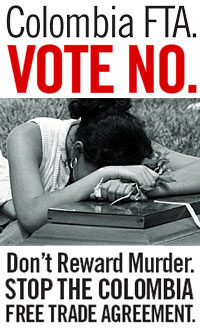Colombia's Three Amigos Rustle Up Support for Free Trade Deal
 Clumsy maneuvering by Burson-Marsteller CEO Mark Penn -- who met with Colombian officials about the U.S. - Colombia Free Trade Agreement while serving as the chief campaign strategist for trade deal opponent Hillary Clinton -- drew unwanted publicity to the controversial pact.
Clumsy maneuvering by Burson-Marsteller CEO Mark Penn -- who met with Colombian officials about the U.S. - Colombia Free Trade Agreement while serving as the chief campaign strategist for trade deal opponent Hillary Clinton -- drew unwanted publicity to the controversial pact.
Colombia's $300,000 a year contract (pdf) with Burson-Marsteller stated the PR firm would "provide ongoing strategic communications counsel to the Ambassador and key Embassy officials"; develop "key messages, talking points and briefing materials"; give "advice and communications counsel to the Ambassador and Embassy staff"; and "co-ordinate media interviews and public events with relevant news media in Washington D.C. on behalf of the Embassy."
Colombia ended the contract after Penn described his meeting as "an error in judgment." But the country isn't hurting for lobbying power in Washington, D.C. -- especially among Democrats.
In January 2008, the Clinton administration's Deputy Under Secretary of Labor, Andrew J. Samet, landed a three-month contract (pdf) worth $58,000, with the Colombian Ministry of Foreign Affairs. Samet, who is a principal and co-founder of the Washington, D.C. lobbying firm Sorini, Samet & Associates, has worked for the Colombian government previously. In 2007, he wrote a report on labor conditions (large pdf) in the country.
Samet's mission is to help neutralize labor movement opposition to the free trade deal. Labor groups are protesting the agreement, saying the Colombian government has not done enough to protect union activists from violent attacks and harassment. "Thirty-nine trade unionists were murdered in 2007, and another 17 have been killed in 2008 -- a rate of more than one a week. Of the more than 2,500 murders of trade unionists since 1986, the government has successfully prosecuted less than 3 percent of these cases," the AFL-CIO states on its website.
Samet claims that while Colombian unionists are still attacked, it doesn't happen quite as frequently as it used to. Samet's contract requires him to "develop a strategy for interaction between the Colombian government and the U.S. labor unions and provide advice for the implementation of this strategy." It also involves assisting "the government of Colombia in presenting information on labor issues with relevant U.S. stakeholders, including U.S. Congress, the administration, labor advocacy groups, trade unions and the media."
It's a tough message to sell. Maybe that's why Colombia hired two other lobbying firms, in addition to Samet's.
Lobbyists in League
In November 2006, the Washington, D.C. firm Johnson, Madigan, Peck, Boland & Stewart registered as a lobbyist for ProExport Colombia, the Colombian government's trade bureau. The firm agreed "to assist in the passing of a free trade agreement." Initially the Colombia contract was slated to run for just 50 days, for a total of $50,000. Then it was extended (pdf) until late June 2008, bringing the firm $240,000.
For Colombia, the Johnson Madigan firm would "identify the significant issues (positive and negative) to everyone involved in the decision making process." The firm also promised to find "third parties" that might be able to "help the Government of Colombia to transmit its arguments and priorities" on the Andean Trade Preference and Drug Eradication Act and the Trade Promotion Agreement (TPA). The "third party technique" is an old PR trick of secretly mobilizing others to take a stance, while obscuring their relationship to the interested party. The result is what seems to be spontaneous declarations of support from independent actors.
Colombia's third amigo is the Glover Park Group (GPG), a Democrat-aligned firm headed by former Clinton administration officials. In May 2007, GPG signed a $40,000-a-month contract (pdf) with ProExport Colombia.
GPG's role is to "identify the most significant elements that members of the congress ... and particularly the Democratic Party, will bear in mind to determine their stand on the TPA." GPG has also been given the job of identifying "within the press, the Congress, the academy, business leaders and in general the United States society, speakers and leaders that can help the Government of Colombia to transmit its arguments and priorities in relation to the TPA." In other words, find more "third party" advocates. The Bush administration benefited from this work when it used pro-trade deal opinion columns and media editorials, to counter opposition to the deal.
Slow Down the Showdown
The campaign to persuade Congress to support the U.S. - Colombia Free Trade Agreement seemed to be entering its endgame. On April 7, President George W. Bush submitted the agreement to Congress, using his "fast track" authority to require the House to hold a vote within 60 days and the Senate within 90 days. But, on April 10, the House voted 224 to 195 to remove the tight deadline. The move allows conflicted Democrats "to postpone a vote on the pact until after the November elections," reported Bloomberg News.
The delay is seen as bad news for the trade deal. Perversely, it may benefit Colombia's trio of high-powered lobbying firms. Faced with an increased likelihood of defeat, the Colombian government may dig deep into their coffers and shower thousands more on Glover Park, Johnson Madigan and Sorini Samet.
Bob Burton is the managing editor of SourceWatch.




